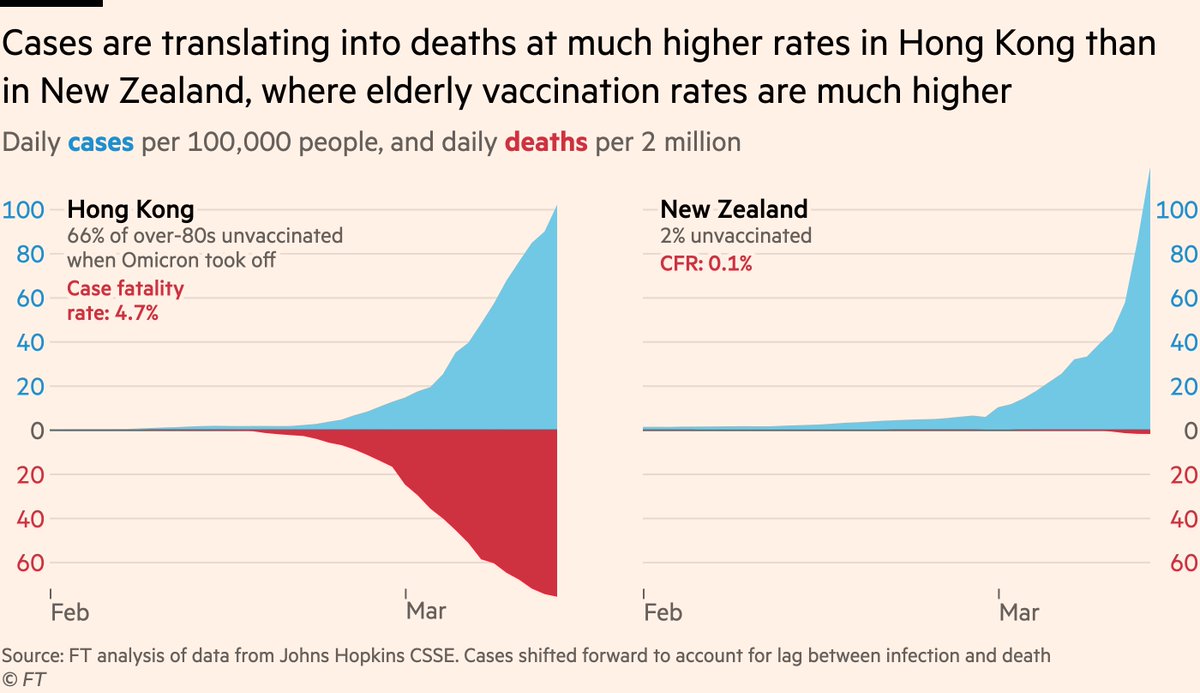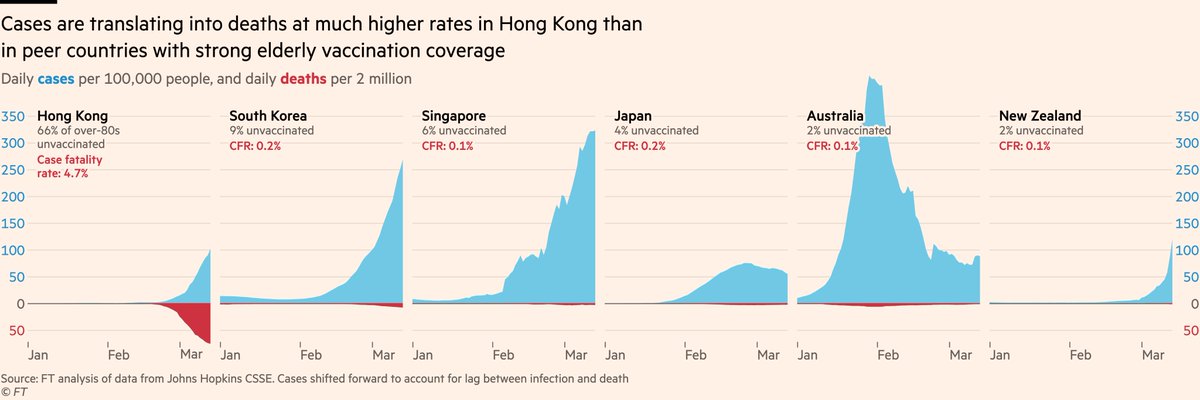NEW: I’m not sure people appreciate quite how bad the Covid situation is in Hong Kong, nor what might be around the corner.
First, an astonishing chart.
After keeping Covid at bay for two years, Omicron has hit HK and New Zealand, but the outcomes could not be more different.
First, an astonishing chart.
After keeping Covid at bay for two years, Omicron has hit HK and New Zealand, but the outcomes could not be more different.

After accounting for lag between infection & death, *1 in 20* cases in Hong Kong currently ends in death.
To put that into context, HK’s case fatality rate (NB different to infection fatality rate) is currently higher than England’s pre-vaccine peak. Two years into the pandemic.
To put that into context, HK’s case fatality rate (NB different to infection fatality rate) is currently higher than England’s pre-vaccine peak. Two years into the pandemic.

Hong Kong doesn’t just look grim when compared to its Asia-Pacific peers.
In March 2020 we saw awful pictures from northern Italy. Last winter, UK & Portugal saw huge mortality spikes, and last summer it was Namibia, but Hong Kong has now set a new global record for daily deaths
In March 2020 we saw awful pictures from northern Italy. Last winter, UK & Portugal saw huge mortality spikes, and last summer it was Namibia, but Hong Kong has now set a new global record for daily deaths

The cumulative view almost looks like a glitch in the data.
Hong Kong’s total death toll has risen almost vertically in the last two weeks, shooting past not only its Asia-Pacific peers, but now European countries including Norway and Finland. And that line will keep rising.
Hong Kong’s total death toll has risen almost vertically in the last two weeks, shooting past not only its Asia-Pacific peers, but now European countries including Norway and Finland. And that line will keep rising.

Comparing Hong Kong to its peers, all of whom kept Covid largely at bay for the best part of two years, it’s extraordinary the extent to which it is an outlier in terms of the lethality of this wave.
So what’s driving this?
So what’s driving this?

Vaccines.
Or more specifically: the elderly vaccination rate.
When Omicron hit, *more than two-thirds of people aged 80+ in Hong Kong were still unvaccinated*, compared to a couple of percent in New Zealand and Singapore. This was a year after vaccines became available.
Or more specifically: the elderly vaccination rate.
When Omicron hit, *more than two-thirds of people aged 80+ in Hong Kong were still unvaccinated*, compared to a couple of percent in New Zealand and Singapore. This was a year after vaccines became available.

Exacerbating this is that most of Hong Kong’s elderly vaccinees had China’s non-mRNA Sinovac shot, which is less effective than Pfizer etc at blocking infection.
Sinovac does fare better against severe disease, but overall this is likely to have contributed to the poor outcomes.
Sinovac does fare better against severe disease, but overall this is likely to have contributed to the poor outcomes.

Now you might think, well, the over-80s are only a small share of the population, so surely this can’t have such an enormous impact on overall fatality rates? 

But that would be to miss the fact that, all else being equal, older people are at far *far* higher risk of death from Covid than younger
https://twitter.com/jburnmurdoch/status/1418952154342166539
So vax rates by age are better understood like this, with bars sized according to each age group’s baseline mortality risk.
That is a helluva lot of red, unvaxxed people. And in Zero Covid countries there are no prior infections, so these people are completely immuno-naive.
That is a helluva lot of red, unvaxxed people. And in Zero Covid countries there are no prior infections, so these people are completely immuno-naive.

In a situation grimly reminiscent of England in March 2020, outbreaks have torn through Hong Kong’s care homes, killing more than 1,000 vulnerable residents in a matter of days.
Again, this is two years into the pandemic.
Again, this is two years into the pandemic.
Here’s our full story, from @mroliverbarnes, @primroseriordan, @imandylin2 and me, on the crisis in Hong Kong and how it got there ft.com/content/6e610c…
But there’s more...
But there’s more...
Earlier I warned about what might yet be around the corner.
Aside from Hong Kong itself, where the surge in cases in recent days is sure to have locked in hundreds more deaths, the looming crisis is mainland China, where elderly vaccination rates are only slightly better than HK
Aside from Hong Kong itself, where the surge in cases in recent days is sure to have locked in hundreds more deaths, the looming crisis is mainland China, where elderly vaccination rates are only slightly better than HK

Around 15 million over-80s in mainland China are still unvaccinated. An astonishing number
https://twitter.com/imjames_k/status/1502625265004027910
In recent days China has locked down tens of millions in several cities, as it braces for a much worse wave than Jan 2020 where the bulk of infection was confined to Hubei province.
Story from @rwmcmorrow @primroseriordan @ruiyanggloriali @KathrinHille ft.com/content/d59c76…
Story from @rwmcmorrow @primroseriordan @ruiyanggloriali @KathrinHille ft.com/content/d59c76…
Some concluding thoughts:
One thing I would hope people take away here is that this really underscores the importance of differentiating between Omicron’s intrinsic mildness and immunity-driven mildness.
One thing I would hope people take away here is that this really underscores the importance of differentiating between Omicron’s intrinsic mildness and immunity-driven mildness.
In December, as Omicron took off in South Africa, many of us emphasised time and again that the observed reduction in severity in a population with lots of vax and infection was likely to be coming as much from that immunity as from intrinsic mildness
https://twitter.com/jburnmurdoch/status/1469338765030313984
What we’re seeing in Hong Kong shows that this was true.
Omicron *is intrinsically milder* than variants like Delta, but that dip in severity is far outweighed by the huge impact of ripping through an elderly population with minimal vaccination and no prior infection.
Omicron *is intrinsically milder* than variants like Delta, but that dip in severity is far outweighed by the huge impact of ripping through an elderly population with minimal vaccination and no prior infection.
Remember my now-infamous chart of England’s Covid infection fatality ratio? Take away mass vaccination of the vulnerable and prior infection, and you could easily end up with something looking more like this.
There’s absolutely nothing mild about Omicron here.
There’s absolutely nothing mild about Omicron here.

Finally, some notes and hat-tips:
1) I have Hong Kong’s case fatality ratio at around 4-5%, where Hong Kong’s official daily report puts it at 0.64%. This appears to be because they are not accounting for the lag between infection and death chp.gov.hk/files/pdf/loca…
1) I have Hong Kong’s case fatality ratio at around 4-5%, where Hong Kong’s official daily report puts it at 0.64%. This appears to be because they are not accounting for the lag between infection and death chp.gov.hk/files/pdf/loca…
2) @tripperhead continues to tirelessly document the toll of Hong Kong’s Omicron wave, including key exchanges from the daily press conferences. Follow him.
https://twitter.com/tripperhead/status/1503289111007973376
3) @PaulMainwood has been highlighting the implications of Hong Kong’s dire elderly vaccine uptake since January.
As the slogan said, "Pay more attention to Paul’s tweets, protect the NHS, save lives"
As the slogan said, "Pay more attention to Paul’s tweets, protect the NHS, save lives"
https://mobile.twitter.com/PaulMainwood/status/1486028862274342919
4) It’s not just Hong Kong currently seeing significant Covid death tolls from Omicron. The case fatality rate in South Korea is lower, but not vastly so, and it’s producing some grim results, as @VincentRK shows in this thread
https://twitter.com/VincentRK/status/1502825617661718533
• • •
Missing some Tweet in this thread? You can try to
force a refresh















